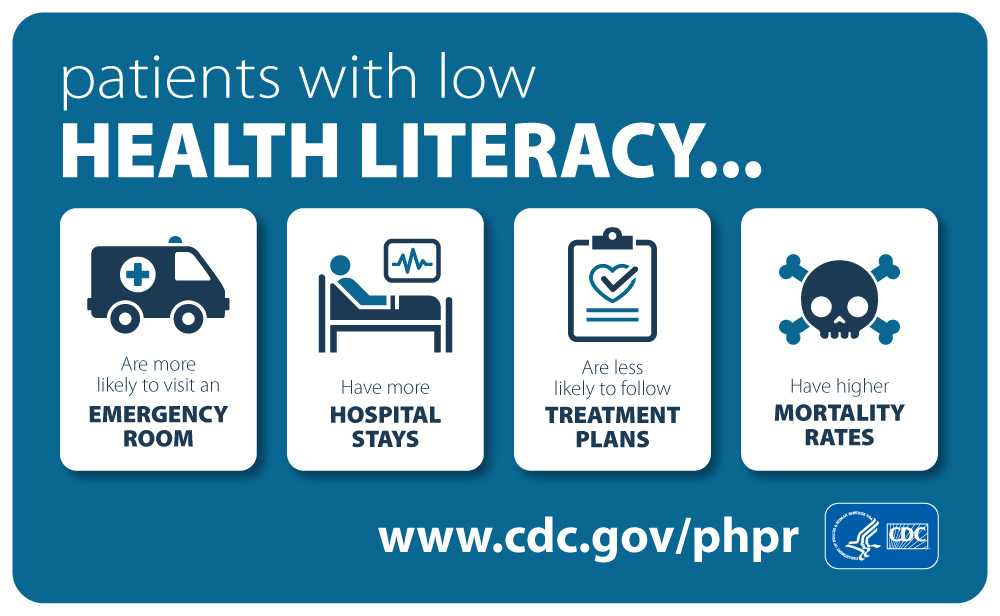Beginning in July, we discussed some principles regarding how best to achieve a healthy lifestyle. These foundational principles included the importance of exercise, good nutrition, and how to manage stress.
However, there are times when we need professional help and therefore must access and navigate the vast and complex vortex known as the US Healthcare Delivery System. To accomplish this successfully, it is helpful, if not necessary, to achieve a level of healthcare literacy.
According to Merriam Webster, to be literate is to be “educated, to have the ability to read and write.” However, in reality, to be literate means so much more. To be functionally literate, one must understand how to process information, ask appropriate questions, and make informed decisions. Perhaps nowhere is this more important than when accessing our healthcare system. Health literacy is necessary to understand certain medical terminology, the importance of undergoing tests, what the tests mean, taking medication, following your physician’s recommendations, and keeping all follow up appointments.
According to MedlinePlus, https://medlineplus.gov, a trusted resource on medical issues, health literacy means having the information and understanding to make good healthcare-related decisions. Additionally, the providers of healthcare, physicians and institutions, have the responsibility of getting the appropriate health information to patients and helping them use that information to make good health decisions for themselves and their families.
There are many components of health literacy: These can include:
- Basic knowledge of medical terminology
- An understanding of how the healthcare delivery system functions, the roles of
various medical professionals
- Fundamental reading and comprehension skills
- Language and culture barriers
- Ability to conduct basic research / information gathering
- Physical or mental impairments
According to the Centers for Disease Control and Prevention (CDC), https://cdc.gov/healthliteracy/index.html, businesses, educators, community leaders, government agencies, health insurers, healthcare providers and the media, all have a part to play in improving health literacy in society.
According to the US Government Office of Disease Prevention and Health Promotion, there are two kinds of health literacy, personal and organizational. Personal health literacy is the degree to which individuals can find, understand, and use information to make informed health-related decisions for themselves and others.
Some guidelines to follow:
- Emphasize people’s ability to use health information rather than just understand it
- Focus on the ability to make “well-informed” decisions rather than “appropriate” ones
- Incorporate a public health perspective
- Acknowledge that organizations have a responsibility to address health literacy
According to the US Department of Health and Human Services (HHS), the “US healthcare delivery system can be complicated and even highly motivated and educated individuals may find the system too complicated to understand, especially when persons access the system in poor health.” Consequently, health literacy skills may actually reflect system complexity rather than individual skill levels.
Unfortunately, many of the same people who are at risk for poor health literacy also have health disparities, defined as “poor base line health based on age, race, gender, or other factors.” Therefore, health literacy is important because it can affect a person’s ability to:
- Communicate well with healthcare professionals, make good decisions about one’s health and medical care
- Get the medical care one needs, as well as preventative care, which is critical to preventing disease
- Take medication correctly and understand the side effects
- Manage disease, especially chronic disease, maintain good health
If someone does not understand something a healthcare professional says, they should be asked to explain it further. All healthcare providers have the obligation to communicate so that patients can understand instructions, including language translation, illustrations and written instructions.
As an example, according to https://www.healthypeople.gov, some individuals with low literacy may not be able to understand test results or prescription labels. Therefore, interventions such as visual aids and counseling, may be necessary to increase understanding and support for patient safety.
There is evidence that an individual may have high overall literacy and still have low health literacy. Low or limited health literacy may be linked to poor health outcomes. Supporting health literacy may improve patient outcomes – a noble goal.
Hospitalized patients are at greater risk for low health literacy if they are admitted with an acute illness. Some acute conditions, such as a stroke, can impede a patient’s ability to speak or comprehend. An advocate may be necessary to support the patient’s stay in the hospital. This could be a family member, a close friend, a healthcare proxy, or a hospital appointed advocacy representative (more on advocacy next month).
Patients with low health literacy also tend to use the emergency department more often, which drives up healthcare costs. Research has also shown that parents with low literacy may negatively impact their children’s health outcomes.
Monitoring health literacy, and supporting it, when necessary, should be the goal of society. Stakeholders include individuals, healthcare professionals and healthcare institutions. Advancing health literacy for patients can improve outcomes, including those of children.
These are certainly worthwhile goals to keep in mind.




